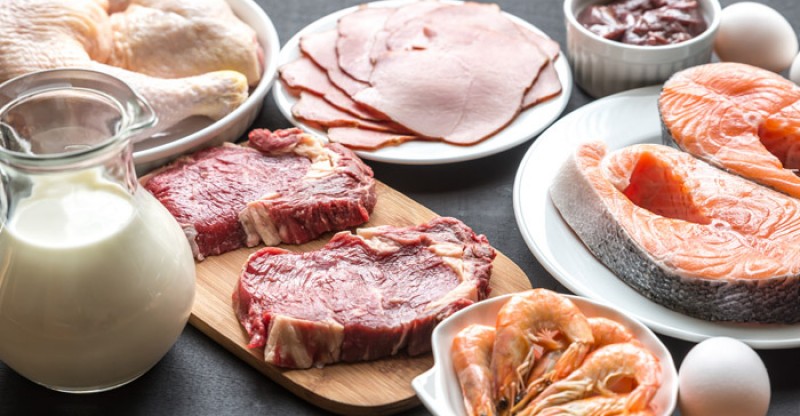How Much Protein Should You Eat Per Day?
The building blocks of life, the most important food group to consume, and the cornerstone of physical health: proteins are everywhere, they are essential and they support virtually every working of the human body.
From muscle growth to bone-density maintenance, from managing healthy hormone balance to stimulating hair growth, your proper protein intake is perhaps the most crucial question to tackle if you want to enjoy a long life full of vitality, strength, and well-being.
Realizing the significance of this substance undoubtedly prompts most health-conscious individuals to look into their unique daily protein requirements rather enthusiastically and wonder, “How much protein should I eat per day?”
This eagerness, however, may just turn into frustration after doing some research on the topic; many will find that recommendations are nowhere near consistent.
Indeed, how much protein to eat is not the most straightforward question, and depending on where you look for information, you might find quite a bit of contradictory data regarding the proper amount of protein intake.
On top of that, several variables complicate the answer, as you will see for yourself after reading this article.
When you look at your actual protein requirements, it makes sense to begin your investigation with officially endorsed sources, such as the Food Plate, published by the USDA (United States Department of Agriculture).
According to this table, adult males and females who are not overly active should eat approximately 5-6 ounces of protein a day (1).
Dietary Reference Intake (DRI) suggests even lower amounts for the average sedentary American: about 0.36 grams per pound of body weight, or approximately 0.8 grams per kilogram, which results in an even-lower protein-intake recommendation (2).
Are you confused or discouraged yet? You are not alone.
Finding the answer to the question “how many grams of protein do I need?” won’t have a one-size-fits-all type of resolution at all.
Your unique bodily needs depend on a number of things that deserve an explanation in far greater depth than any simplistic online macronutrient calculator could ever offer.
What are proteins, anyway?
What do they do to your body, and why are they so important exactly?
These are essential questions to understand – long before tackling the answer to actual amounts of protein required – if you want to take the appropriate steps towards greater health, strength and overall physical well-being.
What Do I Have to Understand About Protein?
These large molecules, comprised of one or multiple chains of amino acids, are the core compounds of organic, physical life as we know it.
Twenty different types of amino acids make human life possible; various longer protein chains are created for their particular functions by varying the sequence and type of amino acids that are used.
Protein chains are used throughout virtually the entire body to build all its components; the tissues of bones, muscles, skin, hair, all cells, and even hormones depend on their presence for proper functioning from conception to death.
Our amazing bodies are quite capable of creating many of these vitally important amino acids to build protein molecules from; however, this is not true to every single one of them.
Those that can’t be produced must be consumed by eating a protein-rich diet on a day-to-day basis.
Amino acids are not stored in the body for extended periods of time, which requires you to strictly follow the intake recommended for your particular situation and bodily needs.
To illustrate just how essential these amino acids are in reality: if you fail to replenish your body with adequate amounts of protein on a consistent basis, you will eventually start to witness the slow deterioration of your muscles.
The body won’t start with your muscles, as there are likely plenty of cells that are in excess or aren’t in prime condition that it will consume first (autophagy) rather than use necessary and healthy muscle.
However, when those are used up, the body will turn to your muscles and break them down to supply itself with these much-needed amino acids.
That will leave you looking and feeling worse over time.
What Foods Should I Eat to Meet My Daily Protein Needs?
When it comes to protein, it is important to understand that it is not enough to be aware of the amount required each day.
It is also vital to eat the right types of protein so that the body’s ongoing need for essential amino acids can be fulfilled.
As their name suggests, essential amino acids are the ones that your body requires every day, yet it is incapable of producing them on its own.
Complete proteins, which have all of the essential amino acids, are, therefore, vitally important for the body’s proper functioning, growth, and health.
Not surprisingly, these are mostly found in animal-sourced food products.
Daily consumption of eggs, dairy, meat and/or fish seems to ensure the most abundant availability of complete proteins for all bodily organs and cells; however, those who follow a completely plant-based diet needn’t worry too much, either.
Vegan proteins are referred to as “incomplete proteins” simply because they do not contain all the essential amino acids; however, a protein-rich diet is still possible if you are carefully selecting your daily plant foods with complementary proteins present.
The proper combination of these, if eaten regularly, will provide your body with these much-needed nutrients without the need to consume animal proteins if this is your dietary preference.
The greatest plant-based protein sources are legumes, soy, nuts, rice, seeds and especially quinoa.
Some of the most-commonly recommended food pairings to make complete proteins are rice with beans, quinoa with legumes, or peanut butter on a rice cake.
Make sure to consume them daily in a great variety if these are your only sources of protein!
Supplementary protein powders are another option to cover your body’s daily protein needs.
Such powders are usually derived from whey, soy or casein protein sources, and they are primarily recommended to those who engage in vigorous muscle-building physical activities, are in an active phase of growth, or are not consuming enough protein on a daily basis due to dietary restrictions.
How Can I Benefit from Eating Enough Protein?
As you can see, eating enough protein – as well as choosing the right kind – is a vital step to take to ensure your health and longevity, but if you are wondering just how many ways your body takes advantage of this amazing macronutrient, read on!
Protein and Healthy Weight Management
Did you know that eating enough (but not too much) protein is probably the single greatest way to maintain your healthy body weight, or lose a few (or more) pounds?
Indeed, protein has threefold benefits when it comes to regulating weight problems.
First, it boosts metabolism, by adding as much as 15 to 30 percent to your regular metabolic rate, which ensures that you burn the consumed calories off faster, rather than converting them into body fat (3).
Additionally, studies find that lean tissue helps you maintain a healthy body weight: each pound of muscle burns several extra calories each day (4).
Second, it increases satiety – the feeling of being full during eating – which leads to reduced calorie consumption, maintaining the ideal calorie intake, or (by eating fewer calories than what the body needs) successful weight loss (5).
Eating enough protein is also found to be much more filling in comparison to eating more carbs or fats (6).
Third, as discussed above, protein also helps the body retain lean muscle mass during dieting.
When sufficient protein is in the diet, the body will not need to break down existing bodily protein (including muscle tissue) to obtain the protein it needs for other functions.
Dieters often worry about rebound weight gain and for a good reason; those pounds – shed with hard work and dietary restrictions – usually return, often twice as fast as they’ve left, which leads to the famous yo-yo effect.
The good news is, however, that those who stick with a higher protein diet are much more likely to be successful at keeping their ideal weight.
Research suggests that even a minor increase in protein intake (from 15 percent to 18 percent) can lead to a 50 percent reduction of rebound weight gain (7).
To reap all these benefits, make sure that 30 percent of your daily calorie intake comes from protein sources, which translates to slightly under 700 calories of protein each day in the case of a 2,000-calorie diet.
This amount corresponds to approximately 5 oz – or 150 grams – of actual protein consumed.
Research also shows that a strong restriction of carbohydrates and a higher percentage of fat (alongside higher protein) leads to more appetite suppression and fat loss.
This is known as ketogenic eating (8).
Protein and Muscle Growth
As previously mentioned, protein-rich foods are extremely important to prevent muscle atrophy, the slow wasting away of lean muscle tissue (9).
If, however, you want to do more than merely retaining your existing muscle mass, you can’t stop here.
It takes the presence of additional protein to increase the size and density of your lean muscle tissues (10).
Having greater muscle tone is not only beneficial for increased weight loss, but it improves the shape of the body, helps to support the skeleton and improves endurance and heart health.
It may even add years to your life.
If you are attempting to increase lean muscle mass, you need to increase your protein intake as well.
While it’s hard to pinpoint the right amount, studies show that the traditionally recommended 0.36 grams of protein consumed per pound of body weight is probably nowhere near enough; you should aim to eat around 1 gram for each pound of weight (or 2.3 grams for every kilogram) (11,12).
Protein and Bone Health
The benefits of eating enough protein don’t stop merely at weight loss and improving body composition.
Studies now show that protein – along with minerals that often accompany them in food, such as magnesium or calcium – is responsible for building robust and resistant bones as well.
While this attribute is important throughout life, it becomes even more vital as we age.
Osteoporosis is a disease that has a devastating effect on the elderly.
Not only does the body seem to have a harder time converting dietary protein into the muscle with each passing decade, but older people also tend to consume fewer proteins, which puts them at a higher risk for development of brittle bones (13).
To prevent osteoporosis, seniors should increase their regular protein intake as well: 0.5 to 0.6 grams per pound of body weight (or 1 to 1.2g per kg) is an ideal amount to replenish an aging and possibly malnourished body (14).
Consuming an adequate amount of protein also speeds up the healing of various injuries and traumas by providing enough energy for the body to concentrate on the optimal restoration of tissues and bones (15).
Other Benefits of Eating Enough Protein
There are some other, lesser-known health benefits of eating your protein.
Believe it or not, it improves brain function and memory retention, boosts your healthy hormone production and lifts your mood.
Protein can even help you to retain youthful looks, energy levels, and vitality.
Furthermore, higher protein intake may have “a small beneficial effect” on high blood pressure (16), and it lowers post-meal blood sugar levels in type-2 diabetics (17).
Can I Eat Too Much Protein, and Is It Dangerous?
If eating an adequate amount of protein is so important, it is a valid question to ask whether it is possible to overeat it and risk your health with adverse effects over time.
When it comes to the topic of overdosing on proteins, you may find that this subject – much like many other issues surrounding these vital macronutrients – has also stirred controversies in the scientific community in the past.
Consuming too much protein has been blamed for causing kidney stones, kidney damage, and even osteoporosis, but there is no scientific evidence that very high protein will damage healthy kidneys.
In fact, studies with athletes have shown that the kidneys handle high protein very well (18).
When it comes to people with pre-existing health conditions, such as kidney problems (especially renal failure), naturally the recommended protein intake may vary based on a thorough, personalized evaluation of a health care professional (19).
If, however, you are healthy and not suffering from kidney damage, it is clear that the risks involved with possibly overeating proteins are minimal or nonexistent, while the benefits far outweigh any potential health concerns.
As previously discussed, scientific data shows that osteoporosis is not only not caused by excessive protein intake (20), it is even able to turn this disease around and improve its symptoms, therefore increased consumption is encouraged rather than something to avoid (21).
How Much Protein Should I Eat Per Day?
At this point, you probably have a greater understanding about proteins: what they are, what they are capable of doing and what dietary precautions exist if any.
Now you know that meeting your protein needs is not just a matter of the quantity, but also about quality, to nourish your body with those nutrients it vitally needs for its proper functioning and longevity.
That being said, the question about how much protein to eat remains quite relevant and important to investigate.
Multiple factors need to be looked at to find the answers.
How Many Grams of Protein Do I Need?
As this article suggests, it depends on:
- Your age: growing kids, teenagers, pregnant women and the elderly require more.
- Your gender: men typically need to consume more protein than women.
- Your activity levels: sedentary people need less protein than athletes, especially those primarily working on increasing lean muscle mass.
- Your body composition: if you want to lose weight and keep it off, you need more protein.
- Your physical health condition: eating more protein may aid healing and improvement of your overall well-being.
In the case of a healthy, not overly active adult, protein intake should be somewhere between 0.36 to 0.6 grams of protein per pound of body weight, or 0.8 to 1.3 grams per kilogram.
These numbers translate to approximately 60 to 90 grams of protein for adult men, and 45 to 75 grams for women, each day.
Do not hesitate to increase these amounts if your activity level or health status changes.
For healthy adults, there is no harm in eating more protein than the recommended amounts, and those with an increased protein requirement will only benefit from doing so.
Feel free to also experiment with eating larger amounts when attempting to lose weight.
Don’t forget, protein is your best friend to keep you full longer, burn more calories, melt away fat and improve your body composition.
Finally, remember to check the actual protein amounts in each food item you pick: look at the exact macronutrient breakdown per serving to determine the grams of protein found in each portion.
Make a habit of counting them daily to determine whether you’re eating at target or below, and adjust your diet accordingly.
Whether you eat meat or are a vegetarian if you follow these recommendations each day, you will experience a dramatic improvement in your health and fitness, and you can rest assured that you’ve done your best to give your body plenty of protein for optimum living.
FDA Compliance
The information on this website has not been evaluated by the Food & Drug Administration or any other medical body. We do not aim to diagnose, treat, cure or prevent any illness or disease. Information is shared for educational purposes only. You must consult your doctor before acting on any content on this website, especially if you are pregnant, nursing, taking medication, or have a medical condition.
HOW WOULD YOU RATE THIS ARTICLE?






